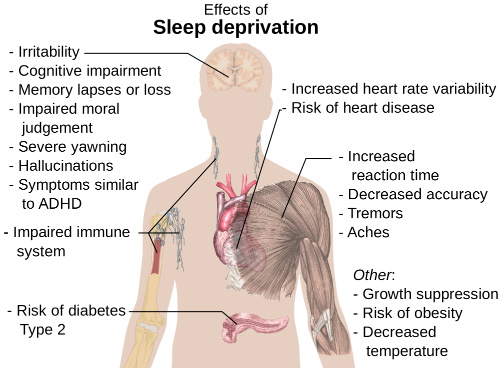- Sleeplessness linked to these disorders in both children and adults.
- Lack of sufficient sleep puts patients at risk for a wide variety of accidents.
- Insufficient sleep is directly linked to automobile accidents, injuries, and deaths.
- All major national, international medical agencies stress the need for sufficient sleep.
- Compliance with sleep hygiene guidelines could reduce obesity, depression rates.

Guidelines
American Guidelines
Many Americans simply do not get enough sleep. This lack of sleep put them at increased risk for a wide variety of disorders. The good news is that a number of interventions have been shown to be effective in treating insomnia. These include a number of pharmacologic approaches, as well as cognitive behavioral therapy, meditation, exercise, and other sleep hygiene techniques.
The U.S. Centers for Disease Control and Prevention (CDC)/National Sleep Foundation recommends the following:
- Go to bed at the same time each night and rise at the same time each morning.
- Make sure your bedroom is a quiet, dark, and relaxing environment, which is neither too hot or too cold.
- Make sure your bed is comfortable and use it only for sleeping and not for other activities, such as reading, watching TV, or listening to music. Remove all TVs, computers, and other "gadgets" from the bedroom.
- Avoid large meals before bedtime.
Canadian, British Guidelines
A group from McGill University has updated a guideline of the National Collaborating Centre for Mental Health. The guideline was called “Depression in children and young people. Identification and management in primary, community and secondary care.”
This group found that poor sleep hygiene is a risk factor for depression in children and young people. The guidelines, promulgated by the British Psychological Society, Royal College of Psychiatrists, instruct family practitioners and pediatricians to openly discuss depression with children who are at risk for – or are already suffering – clinically significant depression.
European Sleep Guidelines
“Help children and encourage young people to get enough sleep. Explain to parents and care givers that this is because lack of sleep may increase the risk of excess weight gain in children and young people. Provide parents and carers with information on age-specific recommendations on sleep,” recommend the European National Institute for Health and Care Excellence (NICE).
These updated European guidelines suggest that children and young people who do not get enough sleep are at risk for overweight and obesity. Conversely, for a young person to get enough sleep reduces the risk of overweight and obesity for that person.

The Data
Metabolic Syndrome
A meta-analysis of 18 studies and nearly 76,000 patients published in Annals of the American Thoracic Society found that “A dose-response relationship exists between short sleep duration and metabolic syndrome. Those who report a sleep duration of less than 5 hours have a 1.5 higher odds of having metabolic syndrome. Our study does not support the notion that long sleep is associated with metabolic syndrome.”
Overweight and Obesity
A systematic review of 11 longitudinal studies included nearly 25,000 participants from diverse backgrounds was published recently in Obesity Reviews. The results suggested an inverse association between sleep duration and body mass index (BMI). Subjects who slept for short duration had 2x the risk of being overweight or obese compared with subjects who slept for a long duration.
“This study provides evidence that short sleep duration in young subjects is significantly associated with future overweight/obesity,” the researchers wrote in the abstract.
Hypertension
Insomnia that is associated with obstructive sleep apnea (OSA) has been found to be closely linked with development of hypertension, according to a meta-analysis of 16 randomized controlled trials including 1166 patients. The study, published in the Journal of Hypertension, found that treatment of OSA with continuous positive airway pressure (CPAP) “promoted significant but small reductions in blood pressure in individuals with OSA.”
Hyperactivity, impaired learning, and depression
Sleep problems in children and adolescents are common, and sleep disruption is associated with a wide range of behavioral, cognitive, and mood impairments, including hyperactivity, reduced school grades, and depression, according to an article published recently in Child & Adolescent Psychiatric Clinics.
“Insufficient or fragmented sleep may induce sleepiness, which is associated with problematic behavior, impaired learning, and/or negative mood,” the researchers wrote. “Furthermore, treatment of sleep disruption, by improving sleep hygiene or treating specific sleep disorders, is often associated with improvements in daytime performance.”
